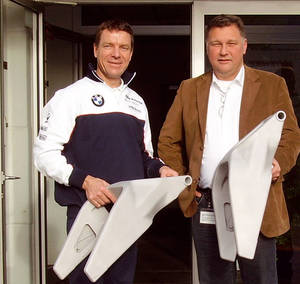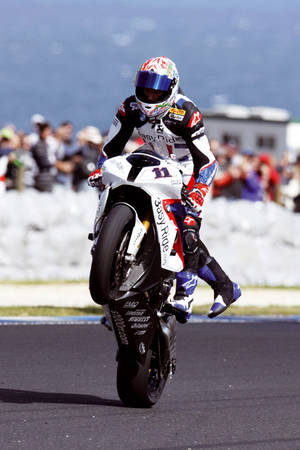 Pete Goddard, Development Engineer at alpha Racing (left) and Georg Borgschulte, Sales Manager of ZOLLERN Feinguss Soest (right) with the new high-tech rear swing fork for the 2011 racing season |
 Troy Corser on his BMW S 1000 RR |
In the 2011 season of the Superbike World Championship, BMW is introducing innovative rear swing forks for its bikes. Following intensive development work, they are manufactured by ZOLLERN from high-strength cast aluminium. The two BMW riders Troy Corser (AUS) and Leon Haslam (GBR) put the new parts through their paces during the latest test drives and are very satisfied with the results. The rear fork from ZOLLERN replaces the previous year's milled part, and saves up to 20 percent of its weight. Other advantages are less undamped suspension and improved handling.
The new fork was developed in cooperation with the BMW Motorrad Motorsport team, alpha Racing GmbH & Co. KG and EDAG, and manufactured by ZOLLERN. The result was a component made of A 357 aluminium, measuring 650 x 260 x 350 mm, and weighing less than 6 kg.
ZOLLERN was initially approached in January 2010, and the first three parts were ready for testing in April. The entirely cast part replaced the original milled version and, after thorough testing and optimisation, was approved for series production in October 2010. Pete Goddard, Ex Superbike rider and now a development engineer at alpha Racing says: "ZOLLERN has turned out to be an excellent partner. They're totally professional, and we were blown away by the results of their manufacturing method."
High-tech aviation technology applied in motor bikes
To manufacture the high-stress part, ZOLLERN uses its patented SOPHIA® process that's ideal for the job and otherwise used by the company in aviation and military engineering. What's special about the SOPHIA® technology is that it precisely manipulates the micro-structure of the material by controlled cooling after casting. That means the molten metal solidifies faster and more evenly than in conventional investment casting. Through the targeted control of the cooling process, the thick-walled and thin-walled areas can be cooled in the same amount of time. This produces a fine-grain, dense cast structure with exceptionally good static and dynamic strength properties. It enables the production of thin-walled cast parts with large surfaces as well as extreme leaps in wall thickness at the narrowest tolerances, combined with top surface and material quality. All this means the wall thicknesses of the BMW fork could be reduced to less than 2 mm. Markus Schmidt, the alpha Racing development engineer responsible for the fork, pinpoints specific aspects, saying: "Apart from the extreme lightweight construction, we were able to modify the design quickly, without extra tool costs, and directly using the engineering master data. It gave us the scope to apply the feedback from our drivers straight into the design of the part."
Click here for further Information and Contact to Zollern GmbH & Co.KG in our Foundries Profile


